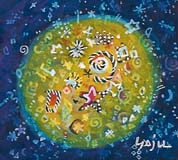| Monday, November 24, 2003 |
| Tech Bloom |
 Excellent op-ed piece "Tech Bloom in full flower" by Alex Steffen. Excellent op-ed piece "Tech Bloom in full flower" by Alex Steffen."The conventional wisdom, during the Tech Boom, was that what drove innovation was the lure of giant piles of cash. That idea now rubs shoulders with the Berlin Wall. What makes creative people tingle are interesting problems, the chance to impress their friends and caffeine. Freed from the pursuit of paper millions, geeks are doing what geeks, by nature, really want to be doing: making cool stuff.Indeed, it is great news. Very cool things are being developed by people who do it because it needs to be done, because it is fun, because other people like it. Money has very little to do with it. It is unstoppable. Imagine when the whole world works like that. [ Inspiration | 2003-11-24 05:20 | 4 comments | PermaLink ] More > |
| Chandler |
Chandler is an open source project envisioned and spearheaded by Mitch Kapor. A very ambitious and well-funded effort, working on bunch of things that really need doing. At the very first glance it might seem like nothing special, just another e-mail, calendar, to-do list kind of program. But it the way it aims and doing things, and how shared it will be that is interesting. See Roger's overview of places to learn more. Like this Compelling Vision.With Chandler, users will be able to organize diverse kinds of information for their own convenience -- not the computer's convenience. Chandler will have a rich ability not only to associate and interconnect items, but also to gather and collect related items in a single place creating a context sensitive "view" of many types of data, mixing-and-matching email, mailing lists, instant messages, appointments, contacts, tasks, free-form notes, blogs, web pages, documents, spreadsheets, slide shows, bookmarks, photos, MP3's, and so on (and on). Data in Chandler is stored on repositories on the user's local machine, on others' machines, and on shared resources such as servers.I've known for a long time that this is what I would want. Seems obvious. And I've made a few attempts of programming pieces of that, that I've never finished. Nobody else seems to be doing it right. But I bet Chandler will go where it intends to go. [ Technology | 2003-11-24 05:37 | 0 comments | PermaLink ] |
| Roger's Voice of Humanity |
 My friend from L.A. Roger Eaton is on a quest. Nothing less than the software that would enable the voice of humanity to be articulated. The wiring that might allow us to pool our thoughts and have our collective mind express what we think and feel and what we want to do. So we can then better take action and set our world straight. Not exactly an easy project, but somebody needs to do it. My friend from L.A. Roger Eaton is on a quest. Nothing less than the software that would enable the voice of humanity to be articulated. The wiring that might allow us to pool our thoughts and have our collective mind express what we think and feel and what we want to do. So we can then better take action and set our world straight. Not exactly an easy project, but somebody needs to do it.
Luckily there are many other individuals and groups and projects and tools that fit in with that, and which one way another works towards it. Nobody can do it alone. Roger is now methodically going through what is out there that might relate, and providing good overviews and analysis of what he finds. Read about it in his blog [ Technology | 2003-11-24 05:55 | 2 comments | PermaLink ] More > |
| Open Source |
| I'm having a little bit of a conflict with myself. See, I believe that the philosophy and practice behind open source software is one of the most powerful and hopeful potentials in the world. Individuals, small teams, large networks doing good things and sharing the results. For a variety of reasons like: it needed to be done; it is fun; other people think you're cool; knowing it is the best way to do things; or just to scratch one's personal itch. The point is that money and greed has relatively little to do with it. But monetary rewards might very well follow from this approach. It all makes sense that the best way of being valuable, and being considered valuable in the world, is to get something useful into as many hands as possible, and making as few barriers as possible to further creativity and improvement.
And, now, one of the roles I've most often played is that of a programmer. I've written a lot of code, a lot of software, some of which has been very useful to others. I've written chat rooms, bulletin boards, calendars, task managers, weblogs, member databases, mailing list managers, website authoring programs, shopping carts, content managers, image manipulation, DNS administration, server monitoring, and probably much more I'm forgetting. But I've never made a program open source. I.e. I've never created a page that you could download a program from, with installation instructions and documentation. And I've never made any meaningful way for others to contribute to the programs I created. Why not? Well, in part it might be that I still have the remainder of a belief that I somehow would be more likely to be paid if I kept the software close to my chest. Despite that a lot of this was given away freely to use on my server. But, even more, it is probably that I'm a perfectionist and my projects are usually a little too ambitious. Meaning, they were never quite finished to my own satisfaction, so I didn't feel they were ready for prime time. And I had usually made some shortcuts that meant that the programs worked alright when they stayed on my server, and when I could fix any problems that popped up. It takes some additional effort to make software solid and generic enough that somebody can just download it and use it in a somewhat different environment, maybe in ways I hadn't foreseen. Most successful open source projects start off by doing one relatively limited thing fairly well. They might grow from there, sometimes tremendously, but they usually start by providing a small amount of well-defined functions. I know that very well. But still, I usually end up trying to include everything and the kitchen sink in my plan, so that even if I do something relatively limited, it has hooks into a bigger master plan, which I usually never quite finish. And therefore the individual pieces might not be easy to give away. I'm considering changing my mind, and picking one of my projects as something I can make limited and solid enough that I can actually export it to other people. Best candidate right now seems to be a program I wrote to easily create databases, which automatically come with online forms submission, admin area, searches, group e-mailing etc. I wrote it first when I noticed that many of the little website database jobs I got were boringly similar. There are some forms on a website people can submit stuff at, and then we keep it in a database, which we need to manage in an admin area, and we might want to send e-mails to people who signed up, etc. That can easily be a few days of work each time. Where really it could be done in 1/2 hour if you didn't have to re-do the same repetitive work. [ Programming | 2003-11-24 07:57 | 14 comments | PermaLink ] More > |